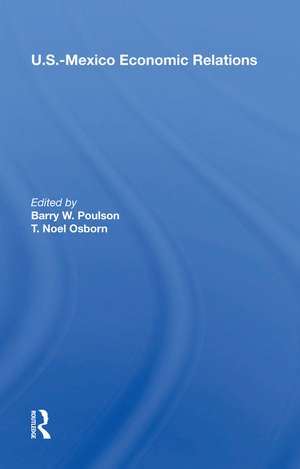U.S.-Mexico Economic Relations
Autor Barry W. Poulsonen Limba Engleză Hardback – 5 mar 2019
| Toate formatele și edițiile | Preț | Express |
|---|---|---|
| Paperback (1) | 268.23 lei 6-8 săpt. | |
| Taylor & Francis – 30 sep 2020 | 268.23 lei 6-8 săpt. | |
| Hardback (1) | 764.20 lei 6-8 săpt. | |
| Taylor & Francis – 5 mar 2019 | 764.20 lei 6-8 săpt. |
Preț: 764.20 lei
Preț vechi: 1154.59 lei
-34% Nou
Puncte Express: 1146
Preț estimativ în valută:
146.25€ • 152.12$ • 120.74£
146.25€ • 152.12$ • 120.74£
Carte tipărită la comandă
Livrare economică 14-28 aprilie
Preluare comenzi: 021 569.72.76
Specificații
ISBN-13: 9780367214203
ISBN-10: 0367214202
Pagini: 466
Dimensiuni: 146 x 229 mm
Greutate: 0.45 kg
Ediția:1
Editura: Taylor & Francis
Colecția Routledge
Locul publicării:Oxford, United Kingdom
ISBN-10: 0367214202
Pagini: 466
Dimensiuni: 146 x 229 mm
Greutate: 0.45 kg
Ediția:1
Editura: Taylor & Francis
Colecția Routledge
Locul publicării:Oxford, United Kingdom
Cuprins
Introduction Part 1: Historical Perspective on Mexico-U.S. Economic Relations 1. Mexico-U.S. Economic Relations in Historical Perspective Part 2: International Trade and the Balance of Payments 2. The Terms of Trade of Latin America (with special reference to Mexico) 3. The Sources of Recent Mexican Inflation 4. The Monetary Approach to the Balance of Payments: An Empirical Study of the Mexican Experience Part 3: Capital Flows and Remittances 5. A Model for Capital Flows Between Mexico and the United States, Including Preliminary Results 6. Investment and Accumulation of U.S. Capital in Mexico, 1950-76: An Econometric Analysis 7. A Theoretical Model of Remittances Sent to Mexico Part 4: U.S. Investment and the Multinational Firm 8. The Decision-Making Relationships Between U.S. Multinationals and Their Mexican Affiliates 9. Surplus Labor, Emigration, and Public Policies: Requirements for Labor Absorption in Mexico 10. The Internationalization of U.S. Capital in Mexico Part 5: Migration 11. Facts and Perceptions of Undocumented Immigration from Mexico 12. A Macro Model of Mexican Migration to the United States 13. Migration from West Mexico to the United States 14. Synthesis of Some Relevant Ideas on Mexican Migration to the United States: A Research Proposal 15. Population, Migration, and Income Distribution: A Proposed Analytical Framework Part 6: The Brain Drain 16. The "National" Importance of Human Capital 17. The Brain Drain from Mexico to the United 18. A Profile of Legal Mexican Migration to the United States Part 7: Education and Human Capital 19. The Economics of Training Mexican Students in U.S. Graduate Schools: A Pilot Study 20. A Community Profile Approach to Education and Migration: Application to Mexico 21. A Markov Chain Model for Educational Institutions in Mexico Part 8: Agriculture 22. Agricultural Developments in Mexico and the United States: Problems and Opportunities 22. Duality with Surplus Labor and Returns to Scale in the Rural Sector: A Theoretical Approach 23. Economics of Appropriate Technology in Food and Fiber Production: The United States and Mexico Part 9: Energy 24. Mexico, the United States, and OPEC: A Potential Energy Triangle 25. Impact of Economic Policymaking Regarding Energy Resources: The Mexican Case 26. Energy Development in Mexico: An Assessment of Its Implications Part 10: Institutions and Mexican-U.S. Economic Relations 27. Institutional Response to Recent Border Problems: Survey and Analysis 28. A Critical Review of the New International Economic Order 29. Mexico: Planning, International Loans, and Economic Policy
Descriere
This book provides insight into the problems affecting both the United States and Mexico to improve not only economic relations between Mexico and the United States, but also social, cultural, and political relations. It deals the problems from both theoretical and practical viewpoints.
